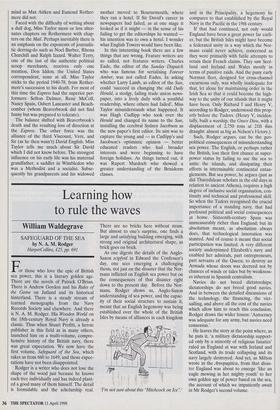Learning how to rule the waves
William Waldegrave
SAFEGUARD OF THE SEA by N. A. M. Rodger HarperCollins, £25, pp. 691
For those who love the epic of British sea power, this is a literary golden age. There are the novels of Patrick O'Brian. There is Andrew Gordon and his Rules of the Game on Jutland and its historical hinterland. There is a steady stream of learned monographs from the Navy Records Society and elsewhere. And there is N. A. M. Rodger. His Wooden World on the 18th-century Royal Navy is already a classic. Thus when Stuart Profitt, a heroic publisher in this field as in many others, launched him on a multi-volume, compre- hensive history of the British navy, there was great expectation. We now have the first volume, Safeguard of the Sea, which takes us from 660 to 1649; and those expec- tations have not been disappointed.
Rodger is a writer who does not lose the shape of the wood just because he knows each tree individually and has indeed plant- ed a good many of them himself. The detail is formidable and the scholarship real. There are no bricks here without straw. But almost to one's surprise, one finds a large and satisfying building emerging, with strong and original architectural shape, as brick goes on brick.
As one digests the details of the Anglo- Saxon scipfyrd in Edward the Confessor's day, one sees emerging a challenging thesis, not just on the disaster that the Nor- mans inflicted on English sea power but on the consequences of that disaster right down to the present day. Before the Nor- mans, Rodger shows us, Anglo-Saxon understanding of sea power, and the capac- ity of their social structure to sustain it, meant that an English hegemony was being established over the whole of the British Isles by means of alliances in each kingdom I'm not sure about this "Hitchcock on Ice".' and in the Principality, a hegemony he compares to that established by the Royal Navy in the Pacific in the 19th century.
If that had continued, not only would England have been a great power far earli- er, but the British Isles might have become a federated unity in a way which the Nor- mans could never achieve, concerned as they were primarily with futile attempts to retain their French claims. They saw Scot- land and Ireland and Wales mostly in terms of punitive raids. And the puny early Norman fleet, designed for cross-channel excursions only, was wholly inadequate for that, let alone for maintaining order in the Irish Sea so that it could become the high- way to the unity of our islands that it might have been. Only Richard I and Henry V, according to Rodger, understood this prop- erly before the Tudors. (Henry V, inciden- tally, built a warship, the Grace Dieu, with a displacement of 2,750 tons at 21ft 4ins draught: almost as big as Nelson's Victory.) Such, Rodger argues, can be the geo- political consequences of misunderstanding sea power. The English, or perhaps rather the British, lost their first chance at super- power status by failing to use the sea to unite the islands, and dissipating their efforts in interminable continental entan- glements. But sea power, he argues (just as did Thucydidean scholars in the old days in relation to ancient Athens), requires a high degree of inclusive social organisation, con- tinuity and technical and professional skill. So when the Tudors recognised the crucial importance of a standing navy, that had profound political and social consequences at home. Sixteenth-century Spain was immeasurably richer than England; but its absolutism meant, as absolutism always does, that technological innovation was stunted. And of course it meant that social participation was limited. A very different society underpinned Elizabeth's navy and enabled her admirals, part entrepreneurs, part servants of the Queen, to destroy an Armada whose doom was decreed not by chances of winds or tides but by weakness- es inherent in Spanish centralism.
Navies do not breed dictatorships; dictatorships do not breed good navies. And in between the detailed discussions of the technology, the financing, the vict- ualling, and above all the cost of the navies which allow him to reach this conclusion, Rodger draws the wider lesson: 'Autocracy was adequate for any army, but navies need consensus.'
He leaves the story at the point where, as he puts it, 'a military dictatorship support- ed only by a minority of religious fanatics' ruled an England at war with Ireland and Scotland, with its trade collapsing and its navy largely destroyed. And yet, as Milton wrote in the Areopagitica, from that disas- ter England was about to emerge 'like an eagle mewing in her mighty youth' to her own golden age of power based on the sea, the account of which we impatiently await in Mr Rodger's second volume.


































































 Previous page
Previous page